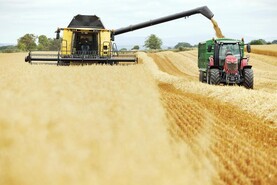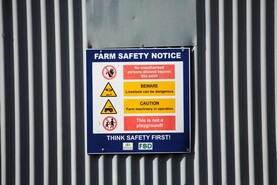The HSA website contains a host of useful information on farming safely, and with farmers under pressure due to tight weather window, compacted calving and breeding and a lack of skilled labour available, fatigue is now becoming a major issue on Irish farms. Fatigue is more than feeling tired. It is a decline in mental and/or physical performance generally due to insufficient sleep over an extended period of time.
This reduces your ability to carry out your farm work safely and effectively, and can greatly increase the potential for serious accidents or injuries on farms.
It can be caused by sleep loss, extended wakefulness, high workload or disruption of your internal body clock. Your internal body clock acts like your own built-in schedule, that helps your body know when it’s time to sleep and time to wake up.
When this gets disrupted because of night work (eg calving), or poor sleep, it can significantly impact you.
Signs of fatigue include:
Losing focus and forgetting things. Lacking energy and motivation. Increased risk taking. Slower reactions. Feeling irritable. Tiredness even after sleep. Noticing the signs and
symptoms of fatigue
Growing evidence shows that short sleep duration and poor sleep quality can, in the long-term, lead to a range of poor health outcomes, such as increased risk of heart diseases, cancers, mental health conditions, neurodegenerative diseases, such as dementia, obesity, type 2 diabetes and chronic pain conditions. One recent study showed that short sleep duration (less than six hours) in midlife is associated with a 30% increased risk of late-onset dementia. In another study, people sleeping less than six hours a night had a 20% higher chance of a heart attack.
Questions to ask yourself
How alert am I? An alert mind will see risks and help you to react quickly, for example, to recognise signs of livestock aggression and to isolate the animal in time or make better decisions when operating machinery. Talk with your partner/peers/farm adviser. It might be impacting you in ways you are unaware of, and/or affecting others around you. If you are working alone on a hard task, keep others updated on your location, the task you’re doing, how you are doing and when you will be back. Taking frequent breaks (5-15min every one to two hours) can increase productivity and reduce the risk of fatigue.
Getting a good night’s sleep during calving season or other busy times can be particularly difficult for farmers. Sleep is important for all ages. Most adults need between seven and nine hours of sleep per night. Problems with sleep can be helped by investing in technology or labour on farm (eg calving cameras or a night-time calver), staying away from mobile or electrical device screens for one hour prior to going to bed, limiting caffeine intake in the hours leading up to going to bed and establishing and sticking to a bedtime routine, which includes going to bed at the same time each night.
Time versus relative risk?
The relative risk of accidents is highest at night, between 2am and 6am, the period of maximum sleepiness, or towards the end of a long working day. This is when your alertness and performance is at its lowest, and you are more likely to make mistakes. A 2022 analysis of farm fatalities in Northern Ireland, showed that fatality rates in farming increase throughout the working week, peaking on Fridays and on Saturdays.
Can I get help with the workload?
While there is a shortage of skilled labour available in agriculture at the moment, there are still opportunities to outsource some work and bring in help at busy periods. Agricultural contractors can be useful to deal with the bulk spreading of fertiliser or slurry in the busy spring period, while there are ample capable agricultural students available that are eager to learn from established farmers, and can aid in the labour requirements on farms greatly.
How can I look after others on farm?
Fair treatment of others working on your farm, and placing their safety ahead of output, is essential in making the farm a safer place, as well as attracting and retaining full-time and casual labour to your farm. Good communication between you and your staff on the risks on the farm, the ability to recognise fatigue and to deal with it, are steps to making the farm an enjoyable and safe workplace.
Long-term benefits
Taking action to manage fatigue, acknowledging that sleep is important for performance for all ages and addressing these needs, can bring numerous benefits for you, your family and your farm. These include improved lifelong health and wellbeing for you and your farm workers, and the reduced risk from fatigue-related errors; as well as the financial impacts of injury, ill health, and fatalities.
Reducing fatigue levels on farms will foster a positive health and safety culture on your farm and build trust and commitment between you and others working on your farm.
The HSA website contains a host of useful information on farming safely, and with farmers under pressure due to tight weather window, compacted calving and breeding and a lack of skilled labour available, fatigue is now becoming a major issue on Irish farms. Fatigue is more than feeling tired. It is a decline in mental and/or physical performance generally due to insufficient sleep over an extended period of time.
This reduces your ability to carry out your farm work safely and effectively, and can greatly increase the potential for serious accidents or injuries on farms.
It can be caused by sleep loss, extended wakefulness, high workload or disruption of your internal body clock. Your internal body clock acts like your own built-in schedule, that helps your body know when it’s time to sleep and time to wake up.
When this gets disrupted because of night work (eg calving), or poor sleep, it can significantly impact you.
Signs of fatigue include:
Losing focus and forgetting things. Lacking energy and motivation. Increased risk taking. Slower reactions. Feeling irritable. Tiredness even after sleep. Noticing the signs and
symptoms of fatigue
Growing evidence shows that short sleep duration and poor sleep quality can, in the long-term, lead to a range of poor health outcomes, such as increased risk of heart diseases, cancers, mental health conditions, neurodegenerative diseases, such as dementia, obesity, type 2 diabetes and chronic pain conditions. One recent study showed that short sleep duration (less than six hours) in midlife is associated with a 30% increased risk of late-onset dementia. In another study, people sleeping less than six hours a night had a 20% higher chance of a heart attack.
Questions to ask yourself
How alert am I? An alert mind will see risks and help you to react quickly, for example, to recognise signs of livestock aggression and to isolate the animal in time or make better decisions when operating machinery. Talk with your partner/peers/farm adviser. It might be impacting you in ways you are unaware of, and/or affecting others around you. If you are working alone on a hard task, keep others updated on your location, the task you’re doing, how you are doing and when you will be back. Taking frequent breaks (5-15min every one to two hours) can increase productivity and reduce the risk of fatigue.
Getting a good night’s sleep during calving season or other busy times can be particularly difficult for farmers. Sleep is important for all ages. Most adults need between seven and nine hours of sleep per night. Problems with sleep can be helped by investing in technology or labour on farm (eg calving cameras or a night-time calver), staying away from mobile or electrical device screens for one hour prior to going to bed, limiting caffeine intake in the hours leading up to going to bed and establishing and sticking to a bedtime routine, which includes going to bed at the same time each night.
Time versus relative risk?
The relative risk of accidents is highest at night, between 2am and 6am, the period of maximum sleepiness, or towards the end of a long working day. This is when your alertness and performance is at its lowest, and you are more likely to make mistakes. A 2022 analysis of farm fatalities in Northern Ireland, showed that fatality rates in farming increase throughout the working week, peaking on Fridays and on Saturdays.
Can I get help with the workload?
While there is a shortage of skilled labour available in agriculture at the moment, there are still opportunities to outsource some work and bring in help at busy periods. Agricultural contractors can be useful to deal with the bulk spreading of fertiliser or slurry in the busy spring period, while there are ample capable agricultural students available that are eager to learn from established farmers, and can aid in the labour requirements on farms greatly.
How can I look after others on farm?
Fair treatment of others working on your farm, and placing their safety ahead of output, is essential in making the farm a safer place, as well as attracting and retaining full-time and casual labour to your farm. Good communication between you and your staff on the risks on the farm, the ability to recognise fatigue and to deal with it, are steps to making the farm an enjoyable and safe workplace.
Long-term benefits
Taking action to manage fatigue, acknowledging that sleep is important for performance for all ages and addressing these needs, can bring numerous benefits for you, your family and your farm. These include improved lifelong health and wellbeing for you and your farm workers, and the reduced risk from fatigue-related errors; as well as the financial impacts of injury, ill health, and fatalities.
Reducing fatigue levels on farms will foster a positive health and safety culture on your farm and build trust and commitment between you and others working on your farm.






 This is a subscriber-only article
This is a subscriber-only article










SHARING OPTIONS: